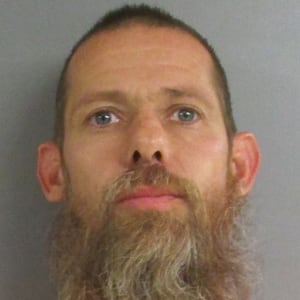When members of a white supremacist street-fighting gang caught charges for their participation in a deadly riot, fellow travelers on the website Gab had a suggestion: Doxx the U.S. officials involved in the case, or maybe just kill them.
A newly unsealed search warrant application from October 2018 reveals that feds were interested in threats made to federal law enforcement on the extremist-friendly social network. The threats concerned a Department of Justice official, a U.S. attorney, a prosecutor, and others involved in a federal case against members of the white supremacist Rise Above Movement. Months earlier, one of the Gab users involved had also helped doxx a blogger, attracting attention from another user who would later be accused of massacring worshippers in a Pittsburgh synagogue.
The warrant sought information—including private messages and IP information—on Chad Bagwell, an Alabama man who posted on Gab and attended at least one white supremacist rally under his own name. The investigation appears to have begun when Bagwell suggested another prominent Gab user doxx (that is, reveal private information on) federal officials, particularly in the Justice Department.
ADVERTISEMENT
The search warrant’s unsealing this week came at an appropriate time: Earlier this month, at least 15 people were arrested in three different alleged far-right plots to kidnap state or local officials. Two of those plots, which targeted Michigan Gov. Gretchen Whitmer, were organized online.
“you wouldn't think of using your considerable doxxing talents on the Federal Government next, would you?” Bagwell wrote to Gab user Hunter Wallace, an account long linked to Brad Griffin, a prominent member of the neo-Confederate group League of the South, in October 2018. “We start with Rosenstein, work our way down to the arresting agents themselves? Get ourselves a big ole' list of any System Pig who's ever harmed our people in any way. Could be a useful thing to have in the event of, um, future contingencies.”
“Rosenstein” was presumably a reference to then-Deputy Attorney General Rod Rosenstein, who did not immediately respond to a request for comment. But the suggestion came amid a discussion by other members of the far-right community about a U.S. attorney and other court officials involved in the case against Rise Above, a white supremacist group that glorifies street-level violence. The group emerged on federal radars after they were seen beating up opponents at the 2017’s deadly Unite the Right rally in Charlottesville, Virginia, where a neo-Nazi murdered an anti-racist protester with his car.
Four members were charged with conspiracy to riot in Charlottesville, which enraged the white supremacist movement. (Four other members of the group would be convicted of conspiracy to riot elsewhere in the country, but three of their convictions were later overturned.)
“Feds arrest four of our guys?” Bagwell wrote in one Gab post included in the search warrant application. “And what are we going to do about it? The real question to ask is, how many federal agents do we have to kill before the rest of them quit doing that?”
Although the warrant does not name Griffin, and does not accuse him of posting court officials’ private information, he had recently used Gab to facilitate the doxxing of an anti-racist blogger who was critical of white supremacists. Griffin posted in July 2018 that he had personal information (including the home address) of the blogger. Those comments attracted the attention of Robert Bowers, the man who would later be accused of murdering 11 people in Pittsburgh’s Tree of Life synagogue in late Oct. 2018. Bowers contacted Griffin, offering more information on the blogger’s home address, The Daily Beast previously reported.
Bagwell could not be reached for comment for this story, and was not charged with a crime. Griffin did not immediately respond to a request for comment, and has also not been charged with a crime in connection to the warrant.
A spokesman from the U.S. Attorney’s Office for the Western District of Virginia declined to comment, as did individuals who were subjects of the potential doxxing but have since left the Department of Justice. The Eastern District of Virginia, which filed the case, did not immediately return a request for comment.
Michael Hayden, a senior investigative reporter at the Southern Poverty Law Center, said doxxing was something of a communal activity on Gab, particularly in 2017 and 2018.
“Especially around that time on Gab, you would get the doxx and then there would be like a celebratory sharing of threats,” Hayden told The Daily Beast. “They would talk publicly about what they wanted to do to somebody. It was very performative as well,” he said, because some users appeared to be trying to incite reactions from anti-fascists who monitored the site.
Bagwell and Griffin may have had offline connections. Bagwell attended at least one rally (a “White Lives Matter” event in Oct. 2017) alongside the League of the South, of which Griffin is a member. Bagwell is also a frequent commenter on Griffin’s blog, including authoring a recent comment claiming to have joined the group.
A Gab representative declined to comment on the search warrant.
“Like most technology companies with millions of users, Gab regularly communicates with U.S. law enforcement on matters concerning public safety,” the representative told The Daily Beast. “We consider all communications with U.S. law enforcement to be confidential and do not publicly comment on specific cases.”
Court documents reveal that Gab complied with the warrant, emailing the relevant files to investigators. It was unclear whether Gab notified the involved users, specifically Bagwell.
Doxxing and murder plots are technically against Gab’s rules. However, the site has sometimes turned a blind eye to users’ bad behavior, allowing them to stay on the site after posting private information. Bagwell’s account, for instance, is still live on Gab, and uses his legal name, despite Gab receiving a warrant for his alleged activity.
Gab took a reputational hit after the Tree of Life massacre, which Bowers appeared to advertise on the website. But although some of its most prominent users moved elsewhere (or in multiple high-profile cases, went to prison), Gab did little to change the site’s culture, which had previously seen people like Bagwell build followings based on their incendiary remarks.
Hayden said the lack of moderation, plus the comfort people like Bagwell felt in using their legal names, had real consequences.
"Gab, from 2017, the lead-up to Charlottesville, up until the Tree of Life massacre, was the worst and most dangerous website I've ever seen,” he said. “It had this combination of this say-anything mentality, and it gave people a capacity to promote their brand and become public figures.”








